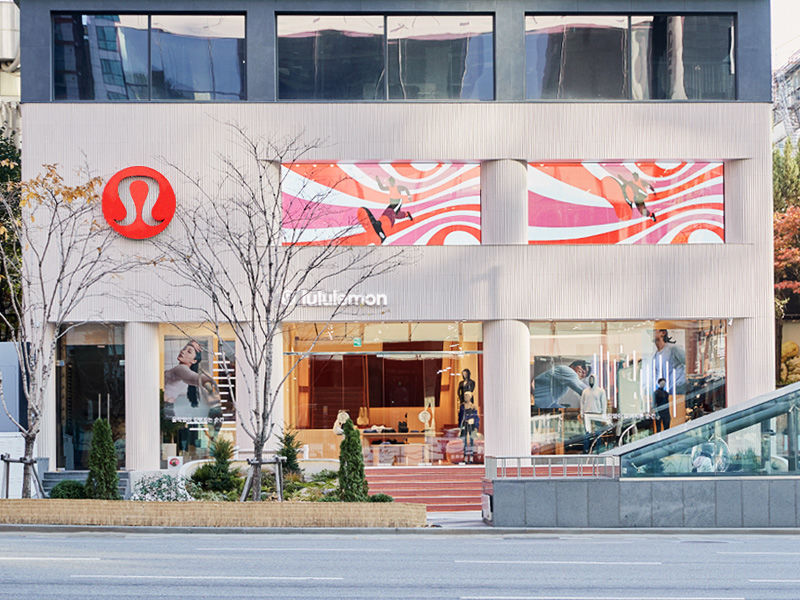Retailers have had to adapt to survive in the age of Amazon (AMZN 1.73%). Shoppers need a reason to physically visit stores and give up the convenience of shopping from their couch. To address this new dynamic, lululemon athletica (LULU 4.19%) is experimenting with a new large-format, multipurpose store it thinks can drive customer traffic and reinforce its lifestyle brand image.
The company's new location in Chicago's Lincoln Park neighborhood is its largest ever and features several amenities not found in a typical athletic apparel store. The 20,000-square-foot store features a yoga studio, gym, meditation area, healthy food restaurant, and, of course, a Lululemon store.

Lululemon's Chicago store. Image source: Lululemon.
Lululemon's largest store is a promising experiment
The massive new complex is designed to attract a diverse range of guests and potential customers. The first floor is a dedicated Lululemon store featuring the company's standard apparel as well as unique merchandise that can be found only at that location. The second floor contains a restaurant called Fuel whose menu lists healthy food options, café drinks, and alcoholic beverages. Fuel guests can enjoy a meatless Beyond Meat burger and wash it down with a beer or craft cocktail. Finally, the location features a full-service gym and yoga studio where customers can become members or sign up for individual classes priced at $25 per session.
The Chicago megastore expands the use case of Lululemon stores and extends its brand into fitness and hospitality. Customers have new, distinct reasons to visit a store, maybe just to meet a friend for a bite to eat or a drink.
This is a hat tip to the successful retail strategy RH (RH +1.86%) has pioneered. RH turned many of its furniture stores into luxurious hotel-like galleries featuring classy bars and dining venues. As a result, RH has seen an uptick in store visitors and retail same-store sales growth.
Lululemon has described the Chicago store as a test that it is not yet ready to roll out nationally. If the concept is successful, don't be surprised to see a large Lululemon store like this open in a neighborhood near you.
An "experiential brand"
Opening the large-format Chicago store is part of Lululemon's push to become "a truly experiential brand." Lululemon has always sought to be a lifestyle brand that embodies the values and attitudes of its active-lifestyle customers, but now the company wants to do more than just sell the clothing and accessories for that lifestyle -- it wants to be a gathering place.

Lululemon's Fuel restaurant. Image source: Lululemon.
If Lululemon is at the center of a community of athletic people, its brand will have more enduring meaning and will inspire a following of lifetime loyal customers. The company refers to its community as "SweatLife" and has been organizing local events to attract people who want to participate in the SweatLife. Last year, Lululemon created and hosted over 4,000 local events, including public yoga sessions, half marathons, and social gatherings.
Lululemon is also testing out a membership program in which customers pay around $128 per year and receive exclusive access to merchandise, a free pair of yoga pants, free shipping for online orders, and free yoga classes. This is not a run-of-the-mill brand loyalty program; it is more like Amazon Prime combined with a yoga studio membership. The goal is to grow Lululemon's SweatLife community and reinforce its branding.
Putting into context the company's goal of building a more experiential brand with a membership program, building larger stores with wide-ranging capabilities makes a lot of sense. If Lululemon sees its membership program and local events helping to drive greater overall revenue, having a physical gathering place will give the company a stronger branding platform.
Building an Amazon-proof retail strategy
The advent of e-commerce led by Amazon has taken away market share from traditional brick-and-mortar retailers. Many retailers, particularly department stores, have had to close stores to adjust to the new reality. Other retailers have employed alternative strategies to drive store traffic. For example, dollar stores and discounters have found continued success by offering a "you never know what's on sale" treasure hunt experience.
Lululemon is not a discounter and therefore has had to think up other ways to stay relevant and drive consumer interest. The company's newfound experience-driven brand strategy is its response to the challenges in today's retail climate. Simply put, a physical, in-person brand experience cannot be cannibalized by e-commerce. Although many of Lulu's initiatives are still in a test phase, they hold promise and support the notion that Lululemon is a dynamic and innovative company that will continue to thrive.








